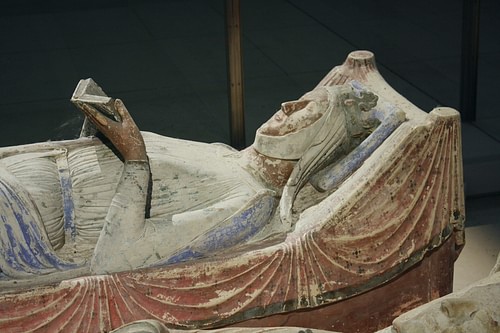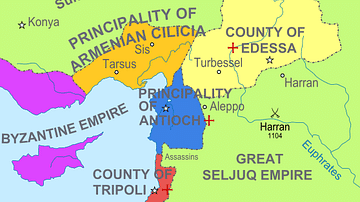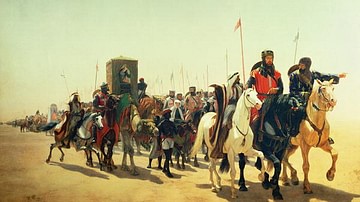Join World History Encyclopedia as they chat with medievalist Katherine Pangonis, all about her new book Queens of Jerusalem, the Women Who Dared to Rule.
Kelly: Do you want to start off by telling us what your book is all about?
Katherine: My book is about a dynasty of women who ruled in the Middle East during the medieval period, specifically in the 12th century during the times of the Crusades. I start with Morphia of Melitene. She was an Armenian princess who married Baldwin II to become the first crowned queen of Jerusalem. I look at her life and the role she played politically during her husband's life and then also the lives of her four daughters and then her granddaughters. The reason I chose to look at these women is that despite living in a quite strongly patriarchal and medieval environment, these women were able to seize real power due to the instability in the region. The fact that Morphia had four daughters was a major factor as well. There were no sons to inherit, which meant that women were able to succeed in political positions and actually wield power. I thought that was really interesting, so my book is looking at how they did that, what they achieved and what the major events of their lives were.
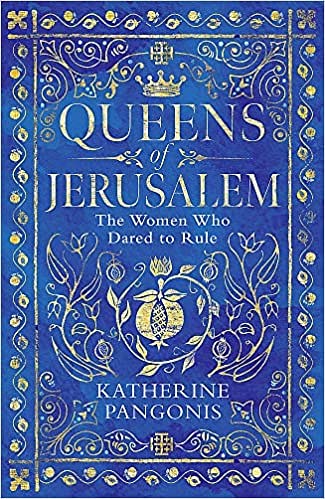
Kelly: So fascinating! I feel like when I did crusader history I did not learn much about the women that were there in power during that time. Is there a gap in the scholarship?
Katherine: For me, that was what brought me to write this book. I would not go so far as to say there is a gap in the scholarship because, in the last 50 years, there has been a lot more attention paid to the roles played by women. There are also a lot more female historians, actually, Natasha Hodgson and Helen Nicholson, who have been unearthing the stories of these women and really shining a light on them. This has mainly been in an academic context, in journals and peer-reviewed articles and this sort of thing, which is great for me as a writer and a researcher, but there really has been nothing in the public sphere and certainly nothing for students studying the Crusades and just the general reader.
Kelly: Reading it as just the general public, it is really accessible and easy to read even for someone who is not super familiar with the time period and the names. At times I forgot that I was reading nonfiction.
Katherine: Yes. You could not make this stuff up, the things that happened and the things they were doing. It is so exciting. It is a rollercoaster at times.
Kelly: You have mentioned a couple of the women in the book. Do you want to introduce the main women from your book?
Katherine: We start with Morphia, she is an Armenian princess. She is born in the region of Melitene and she marries Baldwin II, an arranged marriage, of course. She brings a lot of money with her and an alliance with her father because when Baldwin marries her, he is ruling the county of Edessa, the northernmost crusader state, and it borders on Armenian territory. So, it makes sense for the ruler of Edessa to marry an Armenian woman. Then Baldwin's cousin dies, and he is promoted to be King of Jerusalem. Morphia comes with him, and he actually delays his coronation so that he and Morphia can be crowned together in a sort of equal partnership. She is a queen consort, not a queen pregnant, but it is symbolically very important that he waited for his wife because this is the foundation of this dynasty of really formidable rulers. So, we start with Morphia. Morphia has four daughters with Baldwin, and I go through each of their lives.
I'll start with the youngest, Yvette, because she has probably the least written about her. Yvette has a very traumatic childhood because she is actually traded as a hostage. This is what I mean by political instability; there is war, kidnapping, prisoners of war, etc. At some point in Yvette's childhood, her father is captured, he is in jail, and the only way to negotiate his release is to exchange her with him so they still have a valuable hostage. That is part of Yvette's story, that happens to her when she is very young. Then as a result of that, she actually cannot go on to have a big political career and marry because she is considered tainted by this experience of being held hostage by the Muslims. She actually becomes a nun, but a very powerful one. She rules a very important convent that her older sister builds specially for her.
The next daughter is Hodierna, she becomes the Countess of Tripoli, and she is implicated in a couple of assassinations. She also has a colourful career and also rules this very important territory as regent for her son following the death of her husband. She also has quite a lot of power in her lifetime.
The second eldest sister is Alice. She is a real firecracker. She becomes a princess of Antioch when she is 17-18 years old, by marrying the Prince of Antioch. When her husband dies, she decides she really wants to rule in her own right and be the Princess of Antioch. In order to do this, she will launch not one, but three rebellions against the crown of Jerusalem to try and keep Antioch for herself and rule independently. I will not tell you what happens, but it is a bumpy ride for Alice.
Then her oldest sister, the central character of my book, is Queen Melisende of Jerusalem because she is the heir of Baldwin and Morphia as the eldest daughter. She is really interesting because she is groomed for inheritance from a young age. We see her witnessing charters, standing witness to laws being passed. We see her being acknowledged in official documents as the daughter of the King of Jerusalem, the heiress to the Kingdom of Jerusalem. She is very important, and then she goes on to have this insane and very long political career where she does end up ruling Jerusalem in her own right during one of the most difficult points in the history of Jerusalem in the 12th century.
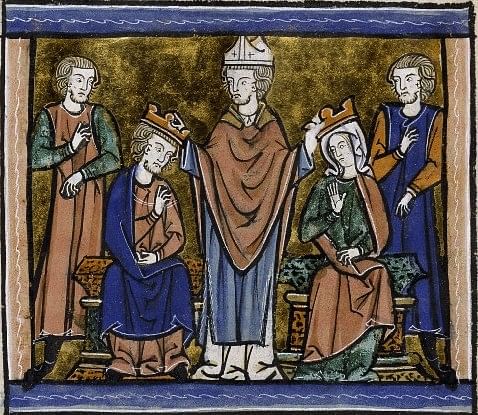
After her, I look at the life of Eleanor of Aquitaine, and it is less of an introduction because she is so well known. Eleanor goes on crusade, and she meets Melisende, and she is received at the courts of Antioch and Jerusalem and has a very interesting career in the East. Following that, I talk about Constance of Antioch, Alice the firecracker from earlier, her daughter, and also Agnes of Courtney, who is sort of an uncrowned queen of Jerusalem. She is a kingmaker, pulls all the strings, but is never crowned, and actually has a very difficult life. She is always presented as evil in the chronicles but is quite a complicated character. Then finally, I talk about the life of Agnes' daughter, Sibylla, who is the final queen of Jerusalem because it was during Sibylla's reign that the city falls to Saladin. Then Sibylla, unfortunately, dies in the siege camp in front of the walls of Acre, trying to retake the city of Acre.
Kelly: Obviously they have all lived remarkable lives, all doing different things, and it is just brilliant to read. You mentioned William of Tyre. I noticed he was probably the main source you got information from. Did you use other sources? How did you work with their views on women and their real stories?
Katherine: William of Tyre is the main source of this period, because he is ahead of his time as a historian, and I think he has got a claim to be one of the best medieval chroniclers of his age because he interspersed proper research, first-person interviews. He talks about how he needs to find something out, so he goes and meets the elderly nun in the convent and has a chat with her, and he uses that in his history. He is using his own first-hand experience of events, interviews with older people who have witnessed more, and other texts. He has clearly got access to some of the earlier sources, and he is a thorough historian. I am writing a new book now, actually, about Mediterranean cities, and I often look to William of Tyre, because every time William comes to a new city, whether it is Jerusalem or Antioch or Tyre, he gives quite a thorough description of its history, or at least what medieval people considered its history to be.
He gives you a lot of background on places, which is interesting. He is the main source because he is writing in the crusader Kingdom of Jerusalem. He is educated in Europe, but he was born and bred in the Crusader States, and then holds some very important positions. He is the deacon of Tyre, then he becomes the archbishop of Tyre, but he is also the chancellor of the Kingdom of Jerusalem, and the tutor to one of the kings. He is the tutor to Melisende's grandson and the court historian of Melisende's son. So, he has got a lot of experience, but for all that he is a brilliant historian, he is not immune to the misogyny of his day. Misogyny is a funny word to apply to William of Tyre because misogyny was a foreign concept. Misogyny is meant to be an irrational or illogical dislike of women – in our society, that is any discrimination against women, any suggestion that women are not equal to men or as able as men. But in those days, that was genuinely considered to be true. It was part of the fabric of society that men and women had different roles and different abilities. It is hard to call them misogynists, but I will for the sake of this conversation, because he does just ignore women.
I did use other sources as well. There are many; as I mentioned before, everyone was scribbling. So you have sources from men at arms, pilgrims who came to Jerusalem and wrote about what they saw, and then you have Muslims, travel writers, men who went on long journeys. You have got sources from a variety of perspectives, the archeological record, and many other things. When you are dealing with the written sources, it is about peeling back these layers of misogyny, and when they say this woman was a witch or this woman was a terrible mother or this woman prostituted herself to men of both high and low rank, you then start thinking this is clearly a takedown tactic. Then you begin to think about why that might be, and so it is about scraping all of those value judgments away that have been applied to the women and just trying to get to the bones of what actually happened and then trying to draw your own conclusions afresh from all of that. It is going through with a fine-tooth comb to find the very few references to women. Going through, finding these references, and then piecing them together, but without the medieval value judgments that had been applied to women. Take all of that away and start looking at afresh.
Kelly: Was it a difficult job to find enough about some of the lesser-known women?
Katherine: Yes. For Alice, to be honest, and her rebellions, we have very few sources apart from William of Tyre. I think there is one Islamic source that says there was internal strife or something like that. For some of the events, we only have one source for them, which means you do just have to take someone's word for what happened. More often than not, I am happy to trust William of Tyre's version of events. I mean, occasionally he gets his chronology muddled, which inevitably happens because, as I say, he is a historian conducting interviews, so he would talk to someone and they would say things like this battle must have happened in this year because that is the year my dog died. They are using all hearsay and putting the history together. That is not a direct quote, but that is the thing I imagine being said to him. In terms of understanding Alice's rebellions, for example, we do not have a lot of sources saying what happened with Alice. We mainly have William of Tyre for explaining that. I, as a historian, would like two or three more sources telling me what happened in those rebellions so that I feel confident that what I am saying really is quite accurate.
Kelly: We glossed over Eleanor of Aquitaine earlier. Do you want to tell us a little bit about her role in the Crusades, since she did not come from a city in Outremer?
Katherine: She is not a crusader queen in the conventional sense, but she is a crusader queen because she goes on crusade. Eleanor is the first queen to go on crusade, and it is very exciting that she does this. Eleanor was born in the south of France, and when she is a teenager, she marries Louis of France, who is, at this point, the prince, the dauphin. He is going to be the King of France, and then something like a month, maybe even less, after their wedding, his father dies, and Eleanor suddenly finds herself the Queen of France and has to move up to Paris. Then she and her husband get involved in quite a lot of quite dodgy political scrapes, one of which ends up with Louis going to war with one of his lords, one of his neighbouring noblemen, and burning a village. And not just burning the village, but burning all the inhabitants of this village to death inside a church, which is called the Holocaust of Vitry. You do think of the medieval period as being more brutal, but actually, this is beyond the pale, even for them. This and some other things start Louis on this penitential path. When Edessa, the territory that Melisende's mother was from, is captured by the Atabeg Zengi in the 1140s and Edessa falls, the crusader states ask for help from the west. Melisende and the others say we need some help, and the Pope backs them and issues of papal bull telling the kings of Europe to go help them. Louis takes up this call, as does the German king, but Louis does something a bit different because he brings his wife, and there are lots of reasons why this might have been. It may be that he just did not want to be apart from her. It may be that he was worried she would be unfaithful to him if he left her behind. It is potentially a valid concern.
So, Eleanor goes on crusade. They have a very difficult journey. It would have been a traumatising experience for Eleanor. The journey through Europe to Constantinople, Istanbul, would have been fine. But then the crossing Anatolia, the Anatolian Plateau is awful, and the German army has gone ahead of them and been completely massacred. On this journey, they are going to be passing the unburied bodies of their fellow knights who died. Then they also get into a huge battle on Mount Cadmus, which is an obstacle they pass to get to the sea. It is a mountain, and they have to get up it, and there is a complete tactical disaster. In Antioch, Eleanor's uncle is Prince Raymond of Antioch, married to Constance, who is the granddaughter of Morphia. Raymond has come over from France to marry her, and they have a lot in common. They are both from the south of France, they are from the same family. They end up spending a lot of time together, and then the rumours start to fly that they are having an affair. Raymond and Louis have a massive falling out. Eleanor says she wants to stay with Raymond in Antioch, and Louis basically drags her away unceremoniously to Jerusalem.
Then she is in disgrace, and we know that because, in Jerusalem, they have a big war council of which Melisende is one of the key attendees. William of Tyre, a very careful historian, gives a list of about probably 40 people who are at this council. Melisende is on that list. Eleanor is not on that list. If Eleanor had been at that war council, he would have told us, and she was not. Eleanor is trying to ask for a divorce on the way home, they take separate ships home. They cannot bear to be together. They go to the Pope, potentially to ask for a divorce, and the Pope literally makes them get into a bed together in front of a load of people to symbolise their marriage being healed. They divorced a couple of years later anyway. Those are Eleanor's experiences on crusade.
Kelly: Do you have a favourite woman that you researched and wrote about in your book?
Katherine: Oh, it is a tough question. When you write about anything to do with the crusades, you always have to bear in mind that these women are really interesting, but you cannot really like them because they are colonists. They are a part of an oppressive regime taking land from native people. But if we look at it externally from that, I should say Melisende, Melisende should always be my favourite because she is the most important and the most powerful. But for me, it is this minor character, Theodora, who sort of sneaks into one of the later chapters because she is married to Melisende's eldest son, Baldwin III. She is a Byzantine princess who comes over for a political marriage, but then Baldwin dies, and she is left a widow at the age of something like 17 because she married him when she was about twelve. She has no children, and she is given this very nice city, Acre, to essentially be locked away in it and just live quietly forever. It is unlikely she would ever be allowed to remarry or have children because the king of Jerusalem would gain nothing from that. He would actually lose control of the city if he let her remarry.
She has this quite grim future laid out for her, and then this completely bizarre event occurs. Her scandalous and philandering uncle arrives in the east. He is fleeing scandal in Byzantium and Antioch; he seduced princesses across the empire. He arrives in Acre, and Theodora just seems to fall for him hook, line, and sinker, and vice versa. They fall in love with each other, and they arrange this elaborate fake kidnapping where she pretends she is going somewhere else. They pretend that he has kidnapped her, but it is obviously consensual because she has told him where she was going to be, and then they elope together. They do not just elope together to another Christian country, they elope to Nur ad-Din's court. They elope to Damascus, to Islamic territory. So, you have the former queen of Christian Jerusalem and a prince of Byzantium eloping to Islamic territory. It is mind-blowing, and it is also a really creepy story because he is her uncle. There is a big age difference as well. But on top of that, Andronicus this uncle, seems really devoted to Theodora, and they stay together for the rest of her life and have children together. It is a bizarre story, but it is also a love story. I found that it was a very interesting subplot to stumble on when I was studying Melisende and her descendants. I thought that was really interesting and really exciting to write about.
Kelly: Thank you so much for joining me today. It has been a real pleasure talking to you.
Katherine: Thank you! Likewise.


